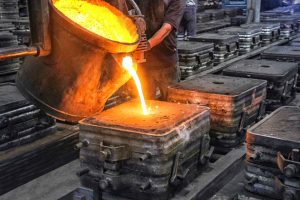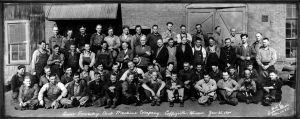 Gray cast iron is a ferrous alloy metal commonly utilized in an array of foundry services. The material’s metallurgical properties offer unique advantages and disadvantages for a wide range of manufacturing applications. From cast iron automotive parts and industrial components to common household products, cast iron metal is one of the most common manufacturing materials across a variety of commercial industries.
Gray cast iron is a ferrous alloy metal commonly utilized in an array of foundry services. The material’s metallurgical properties offer unique advantages and disadvantages for a wide range of manufacturing applications. From cast iron automotive parts and industrial components to common household products, cast iron metal is one of the most common manufacturing materials across a variety of commercial industries.
Below, we discuss the unique molecular composition and material properties of gray cast iron. As one of the industry’s leading gray cast iron foundries, Acme provides quality production solutions for cored and engineered castings. Our foundry specializes in responsive manufacturing services for custom castings with highly complex geometries in order to meet our customers’ most challenging design requirements.
The Material Properties of Gray Cast Iron
The chemical / molecular composition of gray cast iron varies depending on the specific material and application. The gray color that the metal is named for is a result of graphite microstructures and the material’s 2.5% – 4% carbon makeup. The other primary element is silicon, which is 1%–3% of gray iron. For some applications, there will be an addition of manganese at 0.1% – 1.2%. Of course, the bulk of the material is made up of iron.
Gray Cast Iron Benefits
Gray iron’s workability means it can easily be cast into custom-designed components and assemblies. The material offers great compressive strength similar to low-carbon / medium-carbon steel counterparts which tend to be less workable and more expensive.
One unique advantage of gray cast iron is the enhanced damping property of the material. The microstructure and density of the metal enables it to naturally dampen vibrations. This makes it an outstanding material choice for various automotive applications which require end-user comfort as well as for vibration-sensitive industrial equipment.
Finally, gray cast iron excels at withstanding thermal cycling. The material is able to undergo extreme temperature fluctuations without overly straining or developing stress fractures. Gray iron’s outstanding thermal properties are another reason it is an ideal material for various automotive and industrial applications.
Gray Cast Iron Disadvantages
The biggest disadvantage of gray cast iron is its low tensile strength. This results from the graphite flakes within the material – which also give it many of its benefits. Compared to other low-carbon / medium-carbon steels, gray cast iron is more prone to cracks due to impacts and other stress. The damage results from stress cracks forming along the graphite flakes throughout the material, making it an inherent disadvantage.
 Over 115 Years of Quality Domestic Foundry Services
Over 115 Years of Quality Domestic Foundry Services
Founded in 1905 in Coffeyville, Kansas, Acme Foundry has remained one of America’s leading gray iron foundries. Our company specializes in providing custom, complex gray iron casting solutions. As an ISO 9001:2015 certified manufacturer, we ensure the utmost in quality, consistency, and efficiency through all of our unique foundry services.
